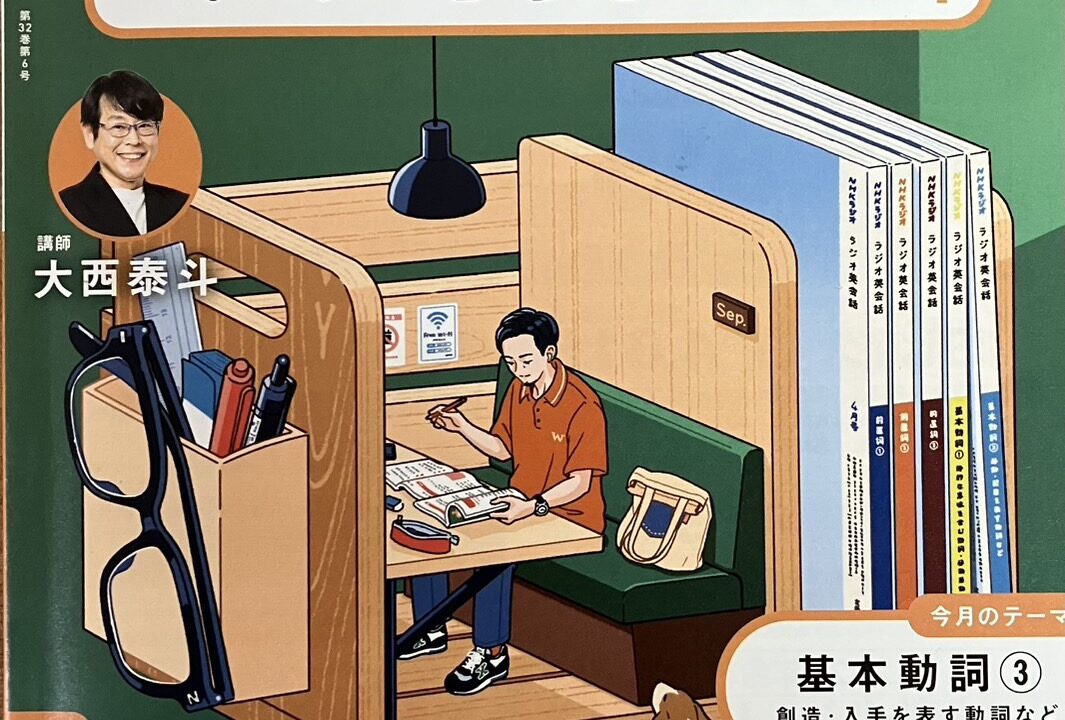【ラジオ英会話】Lesson 109 入手を表す動詞⑥ – getの「動き」 – September 11 Thursday, 2025

September 11 Thursday, 2025
Lesson 109 入手を表す動詞⑥ – getの「動き」
☆Words & Phrases
It’s a lovely morning, isn’t it? – Yes, it is quite nice today.
**Oh dear!:
**spill:
**washcloth:
Be careful with that… – Oh dear! I’ve spilled my tea. Can you get a washcloth?
**somehow:
Somehow I knew that would happen. Here you go. – Thank you. I’m not the man I used to be.
**cheeky:
No, you’re not. – That’s a bit cheeky, isn’t it?
Isn’t that a bit late? – For you or me, perhaps. Not for her.
O: So guys. What’s the difference between perhaps and maybe?
D: “Perhaps” has a more remote or distant feeling. It’s like you’re just tossing out ideas, brainstorming.
R: Yeah. And in contrast, “maybe” has a more solid feel. It has that stronger presence whereas perhaps is like David said, perhaps, ふわふわふわ~~
O: perhaps は理性的な話をしているような感触。日常的な実感からは少し遠いところにある。に対し、maybe は身体から出てくる「実質」を伴っています
☆Grammar and Vocabulary
used to のイメージ
I’m not the man I used to be.
used to ~ は「かつては~だった・〜するのが常だった」を表す助動詞相当のフレーズ
このフレーズのイメージは「(現在との) コントラスト」
意味の焦点は「今はそうではない」にある
付加疑問文
That’s a bit cheeky, isn’t it?
この文は「~ですよね?」と軽い疑問・念押しの意味を運ぶ付加疑問文
もととなる文を軽い疑問文に変え、文末に加える
その際、もとの文と肯定・否定を逆転させるのがポイント!
この文では That’s ~ と肯定文なので「, isn’t it?」と否定になる
肯定・否定を入れ替えるのは、二択にして相手に選ばせるため
「そうなの?それともそうじゃないの?」と相手に選ばせるところに、軽い疑問・念押しの気持ちが宿る
↓当ジムのコースと料金↓

☆Grasp the Concept
What time did Roxy get back last night?
get が非常に高い頻度で使われるのは、この動詞が「動いて手に入れる」だけでなく「動き」一般にその使いみちを広げているため
get back は「戻る」。純粋な移動を表す動詞として使われている
①get + 場所
How did you get to the hospital?
get to ~ は「~に到着する・着く」
get close
get home
get there
↑なら to は必要なし!
close
home
there
↑と、副詞として使われるため
②get to の比喩的な使い方 1
I want to get to know you better.
get to ~
という使い方がある
「到着する」と同じニュアンス
I’m glad we finally got to meet you in person.
↑「機会を得て」の例
OK kids, you two get to decide what we have for dinner tonight.
↑「許可を得て」の例。要するに「到着」
③get to の比喩的な使い方2
Don’t let it get to you.
get to は「感情的に (ネガティブな) 影響を与える」という使い方もある
it (状況) が you に向かって「到着する」ということ
④get at
What are you getting at?
要領を得ない発言をする相手に真意をただす言い回し
at は「(目標) 点」、get はそこに向かう動き
☆Practical Usage
・get to ~
・get home
「今日僕たち、ブラブラできて本当にうれしいよ。すごく楽しかった。気をつけて帰ってね、いい?家に着いたらテキストメッセージを送ってね」
☆Pronunciation Polish
David: All right everyone. It’s time to polish up the pronunciation. First, let’s take a look at today’s phrase,
What time did Roxy get back last night?
All right. We have lots of things to focus on. But they all have something in common. It’s the final sound, the “t,” “d” and “k” sound of /t/, /d/, /k/. These sounds will often disappear at the end of a word. There’s lots of them here. So let’s check it out. First up is the first word, “what,” the /t/ will disappear,
– wha(t)
And we will link it up with “time,”
– Wha(t)time
All right. Next, “did” becomes “di(d)”, get back last night,
All of those sounds at the end will disappear, let’s listen,
– ge(t)bac(k)las(t)nigh(t)
Can you do it with me?
– ge(t)bac(k)las(t)nigh(t)
Okay. Put it together,
– ge(t)bac(k)las(t)nigh(t)
Wow! All right. Let’s put it together and make the whole question,
What time di(d) Roxy ge(t)bac(k)las(t)nigh(t)?
All right. If you can master this, then your English become much smoother. It’s much more rhythmical.
★Ending
O: Actually, I love hanging out with my friends.
D: By hanging out with friends, you mean go drinking.
September 11 Thursday, 2025
Lesson 109 入手を表す動詞⑥ – getの「動き」
(日本語訳・解説付き)
☆Words & Phrases
It’s a lovely morning, isn’t it? – Yes, it is quite nice today.
すてきな朝じゃない? – ああ、今日はとてもいい陽気だ。
**Oh dear!: (驚いたときに) あら!/ まぁ!
**spill: (液体を)こぼす
**washcloth: (皿洗い用の) ふきん (アメリカ英語では「洗面用・浴用タオル」)
Be careful with that… – Oh dear! I’ve spilled my tea. Can you get a washcloth?
気をつけて、その… – ああ、しまった!紅茶をこぼしてしまった。ふきんを持ってきてくれるかい?
**somehow: なんとなく
Somehow I knew that would happen. Here you go. – Thank you. I’m not the man I used to be.
なんとなく、こうなるんじゃないかってわかっていたわ。はい、どうぞ – ありがとう。私は、もう昔の自分じゃないんだ。
**cheeky: 生意気な、ずうずうしい
No, you’re not. – That’s a bit cheeky, isn’t it?
そう、確かに違うわね – それはちょっと言いすぎじゃないかな?
Isn’t that a bit late? – For you or me, perhaps. Not for her.
それは、ちょっと遅いんじゃないかい? – たぶん、あなたや私にとってはそうかもね。
※perhaps は maybe とだいたい同じで、50%程度の可能性を表します
O: So guys. What’s the difference between perhaps and maybe?
ねえみんな。「perhaps」と「maybe」ってどう違うの?
D: “Perhaps” has a more remote or distant feeling. It’s like you’re just tossing out ideas, brainstorming.
「Perhaps」の方はちょっと距離がある感じなんだよね。アイデアをただ投げてるとか、ブレインストーミングしてる感じ。
R: Yeah. And in contrast, “maybe” has a more solid feel. It has that stronger presence whereas perhaps is like David said, perhaps, ふわふわふわ~~
そうそう。逆に「maybe」はもっとしっかりした感じがあるよ。存在感が強いっていうか。一方で「perhaps」は、デイビッドが言ったみたいに…「パーハップス…ふわふわふわ~~」みたいな感じ。
O: perhaps は理性的な話をしているような感触。日常的な実感からは少し遠いところにある。に対し、maybe は身体から出てくる「実質」を伴っています
☆Grammar and Vocabulary
used to のイメージ
I’m not the man I used to be.
私は、もう昔の自分ではありません。
used to ~ は「かつては~だった・〜するのが常だった」を表す助動詞相当のフレーズ
このフレーズのイメージは「(現在との) コントラスト」
意味の焦点は「今はそうではない」にある
付加疑問文
That’s a bit cheeky, isn’t it?
それはちょっと生意気ですよね?
この文は「~ですよね?」と軽い疑問・念押しの意味を運ぶ付加疑問文
もととなる文を軽い疑問文に変え、文末に加える
その際、もとの文と肯定・否定を逆転させるのがポイント!
この文では That’s ~ と肯定文なので「, isn’t it?」と否定になる
肯定・否定を入れ替えるのは、二択にして相手に選ばせるため
「そうなの?それともそうじゃないの?」と相手に選ばせるところに、軽い疑問・念押しの気持ちが宿る
↓当ジムのコースと料金↓

☆Grasp the Concept
What time did Roxy get back last night?
ロキシーは昨晩何時に戻ってきましたか?
get が非常に高い頻度で使われるのは、この動詞が「動いて手に入れる」だけでなく「動き」一般にその使いみちを広げているため
get back は「戻る」。純粋な移動を表す動詞として使われている
①get + 場所
How did you get to the hospital?
どうやって病院にたどり着いたのですか?
get to ~ は「~に到着する・着く」
get close (近づく)
get home (家に着く)
get there (そこに着く)
↑なら to は必要なし!
close(近くに、そばに)
home(家に)
there(そこに)
↑と、副詞として使われるため
②get to の比喩的な使い方 1
I want to get to know you better.
君のことがもっと知りたいのです。
get to ~
「(ある状態) になる」
「(機会・許可を得て) ~ できるようになる」
という使い方がある
「到着する」と同じニュアンス
I’m glad we finally got to meet you in person.
とうとうあなたにじかにお目にかかれてうれしく思います。
↑「機会を得て」の例
OK kids, you two get to decide what we have for dinner tonight.
よし、子どもたち、今夜の夕食は何にするか、君たち2人で決めることができるよ。
↑「許可を得て」の例。要するに「到着」
③get to の比喩的な使い方2
Don’t let it get to you.
気にしないで。
get to は「感情的に (ネガティブな) 影響を与える」という使い方もある
it (状況) が you に向かって「到着する」ということ
④get at
What are you getting at?
何を言おうとしているの?
要領を得ない発言をする相手に真意をただす言い回し
at は「(目標) 点」、get はそこに向かう動き
☆Practical Usage
・get to ~
・get home
「今日僕たち、ブラブラできて本当にうれしいよ。すごく楽しかった。気をつけて帰ってね、いい?家に着いたらテキストメッセージを送ってね」
【解答例】
I’m so happy we got to hang out today. It was really nice. Get home safe, yeah? Text me when you get home.
・am so happy の原因を we 以下の節が示している
・got to は「機会を得た」というニュアンス
・hang out は「ブラブラする」
・safe が safely となっていないのは、get home の後ろならその説明、つまり副詞の働きであることが明白であるため。カジュアルな表現では、-ly を省略することが頻繁にある
☆Pronunciation Polish
David: All right everyone. It’s time to polish up the pronunciation. First, let’s take a look at today’s phrase,
What time did Roxy get back last night?
All right. We have lots of things to focus on. But they all have something in common. It’s the final sound, the “t,” “d” and “k” sound of /t/, /d/, /k/. These sounds will often disappear at the end of a word. There’s lots of them here. So let’s check it out. First up is the first word, “what,” the /t/ will disappear,
– wha(t)
And we will link it up with “time,”
– Wha(t)time
All right. Next, “did” becomes “di(d)”, get back last night,
All of those sounds at the end will disappear, let’s listen,
– ge(t)bac(k)las(t)nigh(t)
Can you do it with me?
– ge(t)bac(k)las(t)nigh(t)
Okay. Put it together,
– ge(t)bac(k)las(t)nigh(t)
Wow! All right. Let’s put it together and make the whole question,
What time di(d) Roxy ge(t)bac(k)las(t)nigh(t)?
All right. If you can master this, then your English become much smoother. It’s much more rhythmical.
★Ending
O: Actually, I love hanging out with my friends.
実はね、友達と「hanging out」するの大好きなんだ。
D: By hanging out with friends, you mean go drinking.
先生の「hanging out」ってつまり飲みに行くってことでしょ?
★LINE公式のお友だち登録はこちら
毎週『ラジオ英会話』を深堀した、使える英語情報を発信しています♪
名古屋駅前【AI×英会話】名古屋BEGビジネス英会話ジム – AIで鍛えるビジネスで使える英語力。仕事も日常も、一歩先へ。
営業時間:平日 9:00~21:00 土曜日 9:00~19:00(日祝休み)
〒450-0002 愛知県名古屋市中村区名駅2丁目40-16 名駅野村ビル 5階


